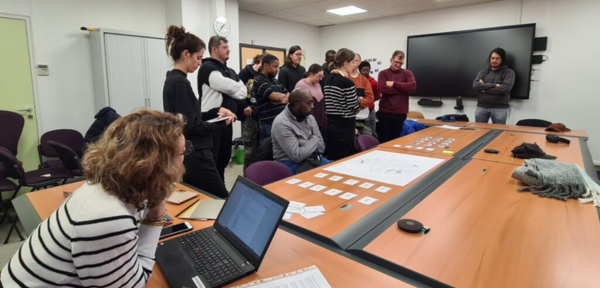Centre de la Gabrielle: GABLAB, Le living lab de la Gabrielle’

Name of practice: GABLAB, Le living lab de la Gabrielle’
Organisation: Centre de la Gabrielle
Country: Seine-et-Marne (Greater Paris Area), France
Funding: GABLAB has received funding from private (Fondation Matmut Paul Bennetot) and public (Agence Régionale de Santé Ile-de-France, European Social Funds) bodies for specific projects. Centre de la Gabrielle also invests in GABLAB’s projects and provides operational support.
Description of the Organisation: Centre de la Gabrielle is a service provider administrated by Mutualité Fonction Publique Action Santé Social (MFPass). Comprising 12 non-profit structures, it supports over 500 people with neurodevelopmental conditions and works to advance research and expertise in best practices, tools, and materials that are useful to guarantee quality support.
Description of Practice:
GABLAB Le living lab de la Gabrielle was launched in 2023 and builds on more than 15 successful years of empirical research at Centre de la Gabrielle. The living lab is a dynamic real-life test environment that promotes co-creation and open innovation between key stakeholders of the disability sector – namely users, public authorities, industry, and academia. Its primary objective is to strengthen service users’ empowerment.
GABLAB is innovative because it takes a concept widely used in the tech world (the living lab method) and moulds it to its needs, to create practices rather than products. It is also innovative in that, in a historically institutionalised and hierarchical world, it proposes to include those we support in the decision-making process and guarantees that all voices have the same power at the table. Finally, since no topic is off limits, GABLAB creates an environment where we can ask difficult questions and re-examine facts that are taken for granted.
The GABLAB process can be summarised in four steps.
(1) First, they use existing channels to collect ideas. At this stage, users and professionals play a key role in identifying potential sources of reflection.
(2) Secondly, their operational team meets to problematise the ideas. Composed mostly of professionals from the Gabrielle Centre, the role of this team is to assemble the working groups that will discuss the various issues that come up. It is also at this stage that budgetary issues are analysed, deadlines are approved, and human resources are mobilised.
(3) The third, and perhaps most crucial step of the process, is when the working groups, composed of users, professionals, experts, and academics, meet. Their exchanges must be ethically sound and, if necessary, external expertise may be brought in at a later stage. Not all working groups reach a final decision, but a summary of their recommendations is transmitted to the competent authority for discussion.
(4) The final stage is the operational implementation of the practice on the ground and the evaluation of the practice. In documenting this final stage, GABLAB assesses the consistency between the expectations that emerged from the working groups and the reality on the ground.
Throughout this process, the Ethical and Scientific Committee guarantees that the Living Lab method is respected. Its members include service users, family representatives, members of the academic community, professionals from the medico-social sector, and partner representatives.
Impact and Sustainability: The impact is twofold. On one hand, through their participation in the working groups, users have a direct impact on the shaping and creation of new practices which, in turn, will determine the quality of the services provided. On the other hand, this participatory method contributes to their empowerment and indirectly to their knowledge of citizens’ participation techniques, thus enabling them to become full actors in their own lives. Ultimately, the idea is that by involving service users, their families and the professionals who support them in the creation of new practices there will be high quality service provision that improves the well-being of users.
GABLAB also seeks to find reasonable accommodations to ensure that people with psychosocial disabilities have the same rights as others. Additionally, they build such accommodations in places where there aren't any. GABLAB also has a space for topics like gender identity, inclusive vocabulary, employment for all – viewing them through a lens that allows no one to be left behind. By ensuring that they evolve at the same pace as society, they also aim to build bridges to allow for better inclusion.
Scalability & transferability: Centre de la Gabrielle eventually hopes to carry out all their future research projects using the GABLAB method, and for it to become a structural element of our work. While GABLAB is designed to serve first and foremost their own community of service users, as well as their families and the professionals who support them, they also aim to disseminate the results they achieve through their networks at national and European level to benefit the wider community.
As they serve people with neurodevelopmental conditions, this audience is their target group. However, the social engineering method they are developing should be replicable in settings serving people with different needs. Indeed, by systematically analysing and documenting initiatives, GABLAB enables them to capitalise on the knowledge produced, while promoting the importance of medico-social research. In turn, GABLAB can make available short reports that enable other service providers to apply similar practices in their environment. The replicability of such practices transforms them into products that can benefit the wider community.
Contact Information: Samuel Chardon, Living lab and Communication Director

